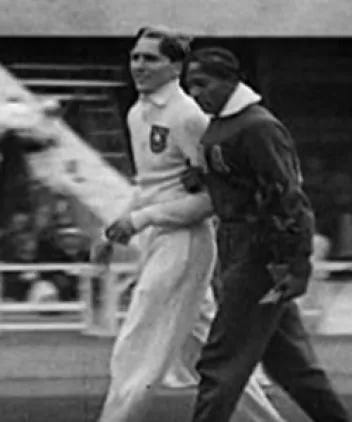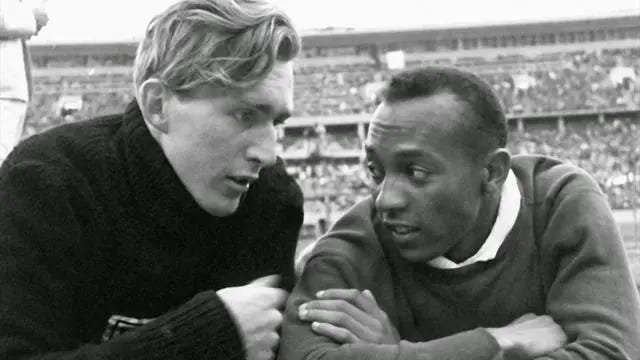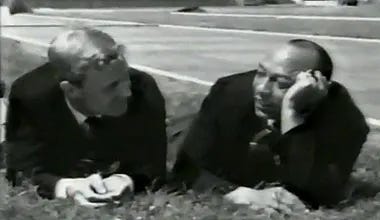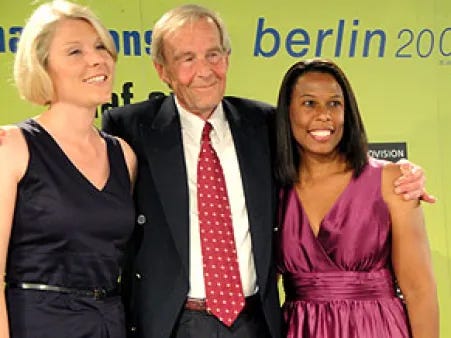July 25, 2024 : Wondercab Mini (72A)
JESSE OWENS AND KARL LUZ LONG AT THE BERLIN OLYMPICS
An Olympics story, in honor of the thirty-third games of the modern era, opening this week in Paris
The simultaneously inspiring and chilling photo above of America’s Jesse Owens, at snap attention atop the winners’ podium as Gold medalist in the long jump at the 1936 Berlin Olympics, flanked by the Japanese Bronze medalist in front of him, and the German Silver medalist in full Nazi salute behind, barely limns the actual drama permeating the occasion.
As many of you will remember, Owens in fact won four gold medals at that Olympics (he also triumphed in both the 100 and 200 meter dashes and as anchor in the 4 x100 meter relays), much to the increasingly enraged consternation of Adolf Hitler and his minions in the stands. But Owens almost didn’t even place in the long jump. He had fouled out on the first two of his three allotted attempts in the qualifying round, at which point his German counterpart, Karl Ludwig “Luz” Long, the holder of the European record, pulled him aside and offered technical advice before Owens’s third attempt, which Jesse went on to ace. In the finals, Jesse soared 8.06 meters,
besting Luz’s 7.87 meters—and Luz was the first to rush up to congratulate him. Even more astonishing, following the award ceremony pictured above, Luz accompanied Jesse on a victory lap around the stadium, the two arm in arm, smiling and waving to the disconcerted crowd.
Needless to say, Luz was sternly spoken to by Nazi party officials following this heretical display of cross-racial friendship. “It took a lot of courage for him to befriend me in front of Hitler,” Jesse would subsequently relate.
“You can melt down all the medals and cups I have and they wouldn’t be a plating for the twenty-four karat friendship that I felt for Luz Long at that moment.”
(Throughout here and in what follows, I am drawing on a long entry on retired U.S. Air Force Colonel Susan O’Konski’s superb World War 2 History Short Stories website.)
And the amazing thing is that somehow they remained friends, corresponding regularly through all of what followed. Luz’s last letter came in 1942 or ’43, after he had been drafted and posted to a Wehrmacht unit, probably in North Africa.
I am here, Jesse, where it seems there is only the dry sand and the wet blood. I do not fear so much for myself, my friend Jesse, I fear for my woman who is home, and my young son Karl, who has never really known his father.
My heart tells me, if I be honest with you, that this is the last letter I shall ever write. If it is so, I ask you something. It is a something so very important to me. It is that you go to Germany when this war is done someday and find my Karl, and tell him about his father. Tell him, Jesse, what times were like when we not separated by war. I am saying—tell him how things can be between men on this earth.
If you do this something for me, this thing that I need the most to know will be done, I will do something for you, now. I will tell you something I know you want to hear. And it is true.
That hour in Berlin when I first spoke to you, when you had your knee upon the ground, I knew that you were in prayer.
Then I do not know how I knew. Now I do. I know it is never by chance that we come together. I come to you that hour in 1936 for purpose more than der Berliner Olympiade.
And you, I believe, will read this letter, while it should not be possible to reach you ever, for purpose more even than our friendship.
I believe this shall come about because I think now that God will make it come about. This is what I have to tell you, Jesse.
I think I might believe in God.
And I pray to him that, even while it should not be possible for this to reach you ever, these words I write will still be read by you.
Your brother,
Luz
And indeed, somehow the letter did reach Jesse. Best perhaps to let Colonel O’Konski take up the story from there:
Karl “Luz” Long was wounded in Sicily on July 10,1943, during the Allied invasion of Sicily in Operation Husky (July 9 – August 17, 1943). He died on July 14 in a British military hospital there. Luz was buried in Motta St. Anastasia German War Cemetery in Sicily. He was 30 years old.
In 1951 Jesse Owens returned to Germany and was able to find Luz’s son, Karl (called Kai). They subsequently recreated the photo taken of Jesse and Luz during the 1936 Olympics,
would stay in contact, and when Kai got married Jesse was the best man.
Jesse Owens died on March 31,1980, in Tucson, Arizona.
But the story of the friendship between Jesse and Luz has continued on with a friendship built between their families. From August 15–23, 2009, the 12th International Association of Athletics Federations (IAAF) World Championship was held in Berlin’s Olympic Stadium where the 1936 Olympics took place. Jesse Owens’ granddaughter Marlene (Owens) Dortch, Luz’s son Karl (Kai), and Luz’s granddaughter Julia represented the Owens and Long families at the August 22 awards presentation to the winner of the long jump.
Jesse and Luz would be proud.
As indeed they would have been. And a tale well worth recalling and savoring these next several weeks as we slog through the appallingly commercialized and jingostically trivialized Olympics coverage we all seemed doomed to traverse.
* * *
See you next week!








Details! They are the source of emotional understanding, and wisdom. Thank you for giving us that letter from Luz, and the generational friendship.
Thanks, so much! A heartwarming story on so many different levels - sportsmanship, courage, friendship.